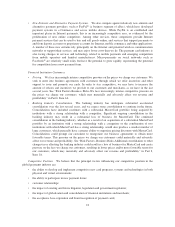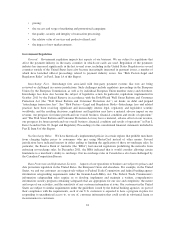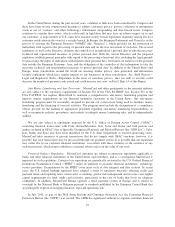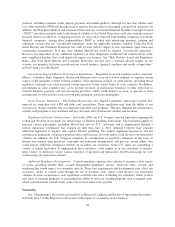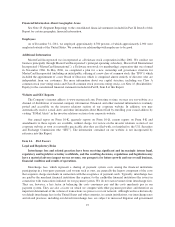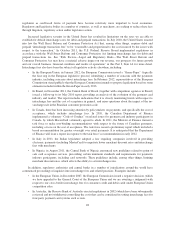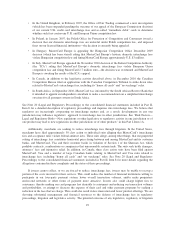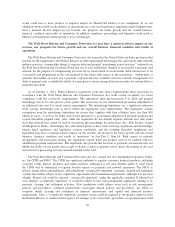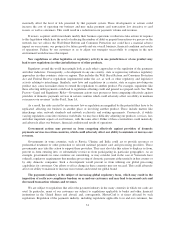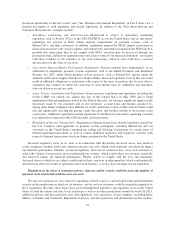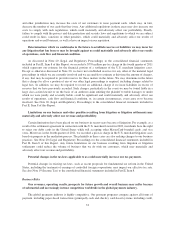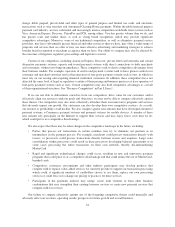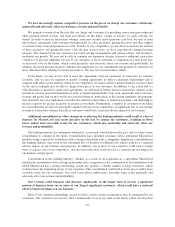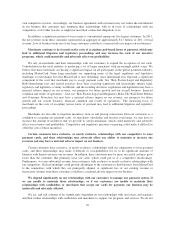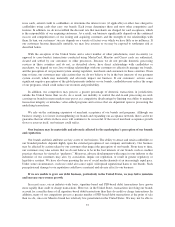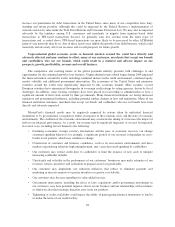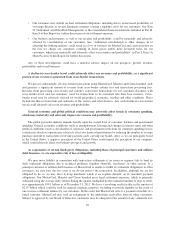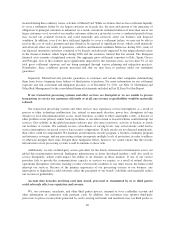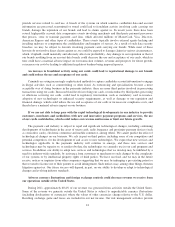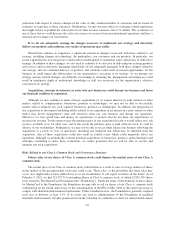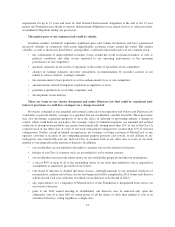MasterCard 2011 Annual Report Download - page 37
Download and view the complete annual report
Please find page 37 of the 2011 MasterCard annual report below. You can navigate through the pages in the report by either clicking on the pages listed below, or by using the keyword search tool below to find specific information within the annual report.and other jurisdictions may increase the costs of our customers to issue payment cards, which may, in turn,
decrease the number of our cards that they issue. Any additional regulations in these areas may also increase our
costs to comply with such regulations, which could materially and adversely affect our profitability. Finally,
failure to comply with the privacy and data protection and security laws and regulations to which we are subject
could result in fines, sanctions or other penalties, which could materially and adversely affect our results of
operations and overall business, as well as have an impact on our reputation.
Determinations which we could make in the future to establish reserves or liabilities we may incur for
any litigation that has been or may be brought against us could materially and adversely affect our results
of operations, cash flow and financial condition.
As discussed in Note 20 (Legal and Regulatory Proceedings) to the consolidated financial statements
included in Part II, Item 8 of this Report, we recorded a $770 million pre-tax charge in the fourth quarter of 2011
which represents our estimate for the financial portion of a settlement of the U.S. merchant litigation cases.
Except as otherwise discussed in Note 20, we have not established reserves for any other of the material legal
proceedings in which we are currently involved and we are unable to estimate at this time the amount of charges,
if any, that may be required to provide reserves for these matters in the future. We may determine in the future
that a charge for all or a portion of any of our other legal proceedings is required, including charges related to
legal fees. In addition, we may be required to record an additional charge if we incur liabilities in excess of
reserves that we have previously recorded. Such charges, particularly in the event we may be found liable in a
large class-action lawsuit or on the basis of an antitrust claim entitling the plaintiff to treble damages or under
which we were jointly and severally liable, could be significant and could materially and adversely affect our
results of operations, cash flow and financial condition, or, in certain circumstances, even cause us to become
insolvent. See Note 20 (Legal and Regulatory Proceedings) to the consolidated financial statements included in
Part II, Item 8 of this Report.
Limitations on our business and other penalties resulting from litigation or litigation settlements may
materially and adversely affect our revenue and profitability.
Certain limitations have been placed on our business in recent years because of litigation. For example, as a
result of the settlement agreement in connection with the U.S. merchant lawsuit in 2003, merchants have the right
to reject our debit cards in the United States while still accepting other MasterCard-branded cards, and vice
versa. Moreover, in the fourth quarter of 2011, we recorded a pre-tax charge in the U.S. merchant litigation cases
based on progress in the mediation process. The plaintiffs in these cases are also seeking changes to our business
practices. See Note 20 (Legal and Regulatory Proceedings) to the consolidated financial statements included in
Part II, Item 8 of this Report. Any future limitations on our business resulting from litigation or litigation
settlements could reduce the volume of business that we do with our customers, which may materially and
adversely affect our revenue and profitability.
Potential changes in the tax laws applicable to us could materially increase our tax payments.
Potential changes in existing tax laws, such as recent proposals for fundamental tax reform in the United
States, including the treatment of earnings of controlled foreign corporations, may impact our effective tax rate.
See also Note 19 (Income Tax) to the consolidated financial statements included in Part II, Item 8.
Business Risks
Our revenues, operating results, prospects for future growth and overall business may suffer because
of substantial and increasingly intense competition worldwide in the global payments industry.
The global payments industry is highly competitive. Our payment programs compete against all forms of
payment, including paper-based transactions (principally cash and checks), card-based systems, including credit,
33


